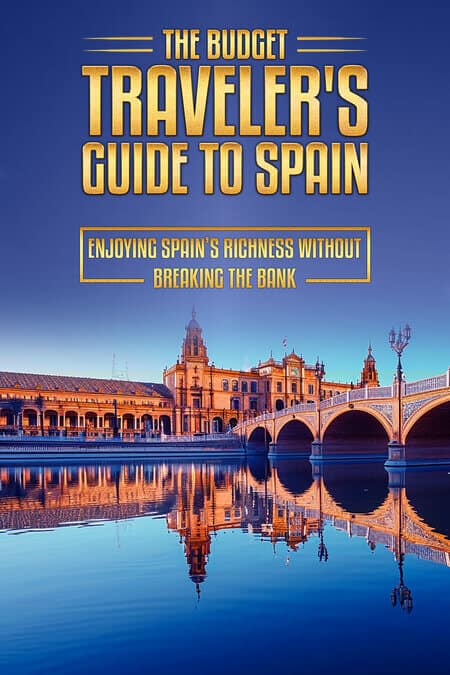Spain Travel Guide
Written by Joeri Van Overloop
Why Visit Spain?
Spain is a beautiful and diverse country that offers a wide range of experiences for travelers. From its rich history and cultural attractions to its stunning beaches and outdoor adventures, there are many reasons to visit Spain on holiday.
One of the main attractions of Spain is its rich cultural heritage. The country has a long and varied history, with influences from a number of different civilizations. This can be seen in the many historical sites and landmarks that can be found throughout the country. In particular, Spain is home to a number of World Heritage Sites, including the Alhambra Palace in Granada, the Cathedral of Santiago de Compostela, and the Old Town of Seville. These sites provide a glimpse into the country's past and offer a unique opportunity to learn about its history and culture.
In addition to its historical attractions, Spain is also known for its art and architecture. The country has a long tradition of artistic expression, with a number of famous artists and architects hailing from Spain. The Prado Museum in Madrid is home to a world-renowned collection of art, including works by Velázquez, Goya, and El Greco. The museum is a must-see for art enthusiasts visiting Spain. In addition, the Guggenheim Museum in Bilbao is an architectural masterpiece and is home to a collection of modern and contemporary art.
Spain is also a great destination for outdoor enthusiasts. The country has a number of stunning beaches and coastal areas, as well as mountainous regions and national parks. The Costa del Sol, located on the southern coast of Spain, is a popular destination for beachgoers, with its sandy beaches and clear blue waters. The Pyrenees mountain range, which runs along the border between Spain and France, is a great place for hiking, mountain biking, and other outdoor activities. In addition, Spain is home to a number of national parks, such as the Sierra Nevada National Park, which offers a variety of outdoor activities, including skiing in the winter months.
The country of Spain is also known for its cuisine, which is a reflection of the country's diverse history and culture. The country is home to a number of regional dishes and ingredients, as well as world-famous wines. Some popular dishes to try while in Spain include paella, a rice dish with seafood or chicken, and tapas, small plates of food served as appetizers. Spain is also home to a number of world-class restaurants, including a number of Michelin-starred establishments.
In addition to its many attractions, Spain also hosts a lot of lively festivals and events every year. The Running of the Bulls in Pamplona is a well-known event, where bulls are let loose in the streets and chased by runners. The Tomatina Tomato Throwing Festival in Buñol is another popular event, where participants throw tomatoes at each other in a giant food fight. These events provide a unique and exciting experience for visitors to Spain.
Overall, Spain is a diverse and exciting destination that offers something for every type of traveler. From its rich history and cultural attractions to its stunning beaches and outdoor adventures, there are many reasons to visit Spain on your next holiday.
Frequently Asked Questions When Travelling To Spain
What Is A Good Budget For A Trip To Spain?
The cost of a trip to Spain will depend on a number of factors, including the length of the trip, the time of year you are traveling, and your personal travel style. Some estimates suggest that a budget of around $100-150 per day per person could be sufficient for a moderate trip to Spain, although this will vary depending on your specific needs and preferences.
To get a better sense of the cost of your trip to Spain, you will need to consider the various expenses you will incur. These may include:
Accommodation: Prices for accommodation in Spain can vary widely depending on the location and type of accommodation. A budget hotel in a smaller city may cost around $40-60 per night, while a luxury hotel in a major city like Barcelona or Madrid could cost upwards of $200 per night.
Transportation: Spain has an extensive network of trains, buses, and flights that connect the different regions of the country. Prices for public transportation will vary depending on the distance traveled and the mode of transportation. A long-distance train or bus ride could cost around $40-80, while a domestic flight within Spain may cost around $50-100.
Food: The cost of food in Spain will depend on your eating habits and preferences. A meal at a budget restaurant may cost around $10-15, while a meal at a more upscale restaurant could cost upwards of $30-40. If you are planning to cook your own meals, the cost of groceries will depend on the specific items you purchase.
Activities: The cost of activities in Spain will depend on what you are interested in doing. Many museums and cultural attractions in Spain have relatively low admission fees, ranging from $5-15 per person. More expensive activities might include guided tours or outdoor adventure sports, which could cost upwards of $50-100 per person.
Overall, it is important to do some research and plan your budget carefully to make sure you have enough money to cover all of your expenses while in Spain.
How Many Days In Spain Is Enough?
The amount of time you should spend in Spain will depend on your personal preferences and interests. Spain is a large and diverse country, with a wide range of attractions and activities to enjoy. If you are planning to visit multiple cities or regions, you will need more time to fully explore the country.
As a general rule of thumb, a week-long trip to Spain might be sufficient to see the main highlights of a single city or region, such as Barcelona or the Costa del Sol. If you want to see more of the country, or if you are interested in spending time in rural areas or smaller towns, you may want to consider a longer trip of 10-14 days or more.
What Is The Best Way To Tour Spain?

There are many different ways to tour Spain, depending on your personal preferences and interests. Some options for touring around the country might include:
Renting a car: Renting a car in Spain is a good option if you want to have the flexibility to explore Spain at your own pace and visit smaller towns and rural areas that might not be easily accessible by public transportation. It is important to be aware that traffic and parking can be an issue in major cities like Madrid and Barcelona, so it may be more convenient to leave your car at a rental agency in these areas and use public transportation instead.
Taking a guided tour: Guided tours can be a good option if you want the convenience of having all of your travel arrangements taken care of, or if you want to learn more about the places you are visiting. There are many different types of guided tours available, ranging from bus tours to walking tours to adventure tours.
Using public transportation: Spain has an extensive network of trains, buses, and flights that connect the different regions of the country. Public transportation can be a convenient and affordable way to get around, especially if you are staying in a major city like Madrid or Barcelona.
Traveling by bike or on foot: Spain is a relatively flat country, with a number of well-developed bike paths and walking trails. If you are an active traveler, you might consider touring Spain by bike or on foot, which can be a great way to really immerse yourself in the local culture and see the country at a more leisurely pace.
Ultimately, the best way to tour Spain will depend on your personal preferences and interests. It is a good idea to do some research and consider what type of experience you are looking for, so you can choose the best option for your trip to Spain.
What Is The Best Time To Visit Spain?
The best time to visit Spain will depend on your personal preferences and the specific destinations you are planning to visit. Here are a few things to consider when deciding when to go:
Climate: Spain has a Mediterranean climate, with hot, dry summers and mild winters. The coastal regions of Spain tend to be warmer and drier, while the inland areas can be hot in the summer and cold in the winter. The best time to visit will depend on your preferences for temperature and humidity.
High season: The high season for tourism in Spain is generally from June to August, when the weather is at its warmest and there are many outdoor festivals and events. This is also the busiest and most expensive time to visit, with higher prices for accommodation and transportation.
Shoulder season: The shoulder season in Spain is from April to May and September to October, when the weather is still pleasant but the crowds are smaller and prices are lower. This can be a good time to visit if you want to avoid the busiest times of year.
Low season: The low season in Spain is from November to March, when the weather is cooler and there are fewer tourists. This can be a good time to visit if you are looking for lower prices and less crowded attractions. However, it is important to be aware that some attractions and activities may be closed or have reduced hours during the low season.
Overall, the best time to visit Spain will depend on your personal preferences and the specific destinations you are planning to visit. It is a good idea to do some research and consider the weather, crowds, and prices to find the best time for your trip.
What Are The Dos And Don’ts In Spain?

Here are a few dos and don'ts to consider when traveling to Spain:
Dos:
Do try new foods: Spain is known for its delicious cuisine, with a variety of regional dishes and ingredients to try. Be sure to sample some of the local specialties, such as paella, tapas, and churros.
Do be respectful of local customs and traditions: Spain has a rich culture and a long history, and it is important to be respectful of local customs and traditions. This includes things like dressing appropriately for religious sites, being mindful of local norms around public behavior, and respecting local laws and regulations.
Do learn some basic phrases in Spanish: While many people in Spain speak English, it is always appreciated when travelers make an effort to speak some basic phrases in Spanish. This can be a great way to show respect for the local culture and to make your trip more enjoyable.
Do stay safe: As with any destination, it is important to take basic precautions to stay safe while traveling in Spain. This includes things like being aware of your surroundings, keeping an eye on your belongings, and being cautious of pickpockets in crowded areas.
Don'ts:
Don't be overly casual: While Spain is generally a casual place, it is important to be mindful of local customs and norms around dress and behavior. For example, it is generally not appropriate to wear beachwear or very casual clothing to restaurants or religious sites.
Don't be rude or aggressive: Spain is a friendly and welcoming country, and it is important to be respectful of others while you are there. This includes things like being patient in line and not being overly aggressive or rude in interactions with others.
Don't be too loud or rowdy: While Spain is known for its lively culture, it is important to be mindful of local norms around noise and public behavior. This includes things like keeping your voice down in public places, especially late at night, and being mindful of your surroundings.
Don't be too rigid: While it is important to be respectful of local customs and traditions, it is also important to be open to new experiences and to be flexible while traveling. This can help to make your trip more enjoyable and memorable.

The Budget Traveler's Guide to Spain
Don't let expensive travel costs hold you back from exploring the beauty of Spain. With "The Budget Traveler's Guide to Spain," you'll discover insider tips and tricks to help you save money while experiencing the best Spain has to offer. Start planning your affordable Spanish adventure today and make unforgettable memories without breaking the bank.
What Are The Visa Requirements For Spain?
Visa requirements for Spain vary depending on a number of factors, including the nationality of the traveler and the purpose and duration of their trip.
For citizens of the European Union (EU), the European Economic Area (EEA), and some other countries, a valid passport or national identity card is sufficient for stays of up to 90 days for tourism, business, or other short-term purposes.
For stays of longer than 90 days, or for purposes other than tourism, business, or other short-term purposes, such as study, work, or residence, citizens of these countries may need to apply for a visa before traveling to Spain.
For citizens of countries outside the EU, EEA, and some other countries, a visa is generally required for any stay in Spain, regardless of the purpose or duration of the trip. There are several types of visas available for Spain, including tourist visas, business visas, student visas, and work visas.
To apply for a visa, travelers will generally need to provide documentation such as a valid passport, a completed visa application form, proof of sufficient funds, and a letter of invitation or confirmation of employment or enrollment in a school or university.
It is important to note that visa requirements and application procedures can change, so it is always advisable to check with the nearest Spanish embassy or consulate for the most up-to-date information.
Do I need Travel Insurance To Visit Spain?
Travel insurance is not required to visit Spain, but it is highly recommended. Travel insurance can provide financial protection in case of unexpected events such as trip cancellations, medical emergencies, lost luggage, and other unexpected expenses.
While Spain has a high standard of healthcare, medical treatment can be expensive, particularly for travelers from countries where healthcare is not covered by the government. Travel insurance can help cover the cost of medical treatment and other expenses in case of an emergency.
In addition, travel insurance can provide peace of mind and help travelers enjoy their trip without worrying about potential problems that may arise.
How To Stay Safe In Spain?
Spain is generally a safe country to visit, but as with any destination, it is important to take precautions to ensure your safety. Here are some tips for staying safe in Spain:
Be aware of your surroundings: Keep an eye on your belongings and be aware of your surroundings, particularly in crowded areas such as tourist attractions, markets, and public transportation.
Keep your valuables safe: Avoid carrying large amounts of cash and keep your valuables such as your passport, credit cards, and other important documents in a safe place, such as a hotel safe or a secure pocket.
Stay in well-lit areas: Avoid walking alone in deserted or poorly lit areas at night.
Use common sense: Trust your instincts and avoid situations that feel unsafe. If you feel threatened or uncomfortable, move away from the situation and seek help if necessary.
Know the local emergency number: In case of an emergency, dial 112 for the police, ambulance, or fire department.
By following these simple precautions, you can help ensure that your trip to Spain is enjoyable and safe.
Where To Stay In Spain?
The Best Booking Resources For Spain
These are the companies I use predominantly when I travel. They offer great customer service and the best value, consistently outperform their competitors, as they always have excellent deals. I rely on them the most, and they are the starting point in my search for travel deals.
Booking.com - This is the best travel partner when it comes to planning your vacation in Spain. With over 28 million listings in more than 200 countries and territories, you'll have no problem choosing from the world's most comprehensive selection of accommodations - from exotic villas to cozy apartments! Booking.com offers a secure and convenient way to book your next holiday, with unbeatable deals that will make sure you get the best value for your money when travelling to Spain.
Skyscanner - This is the perfect tool for finding the best flights at the best prices to Spain. With a comprehensive selection of airlines to choose from, you can compare prices and routes in seconds - saving you time, stress and money. Skyscanner's intuitive search engine makes it easy to find great deals on domestic and international flights. Plus, you can easily customize your search preferences so you get results that fit your budget and destination needs.
Get Your Guide - Are you looking for ways to make your travel experiences more memorable? With GetYourGuide, you can book amazing activities, tours and attractions all over Spain. Whether it’s a tour of an iconic city landmark or unique experience that’s off the beaten path, GetYourGuide offers something spectacular for any traveler. With thousands of things to do and see in different cities around Spain, this platform simplifies the search process with user-friendly filters.


